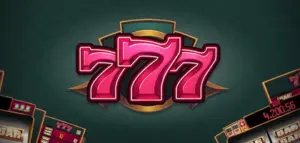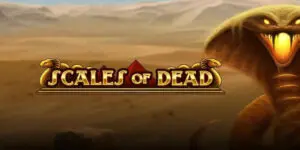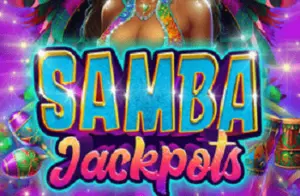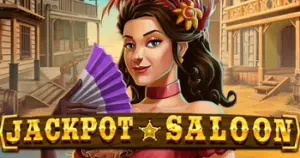How to Play Blackjack – The Complete Guide

by Henry Tamburin
Mastering the Game with Science and Strategy
The odds of winning when playing Blackjack online are better than when playing at land-based casinos. With the right strategy, your chances of winning are even higher. In this Blackjack guide we will teach you how to get the upper hand when playing online blackjack.
Top casinos related to this game
Table Of Contents
- Basic Rules of Blackjack - Hand Value and Game Set-up
- How to Play Blackjack 21
- Blackjack for Beginners: What Happens After the Cards Are Dealt?
- Playing Blackjack - A Few Basic Rules to Consider
- But, for now, let’s begin! To Double, Hit, or Stand?
- Are Blackjack Betting Systems Worthwhile?
- How to Play Blackjack - A Summary
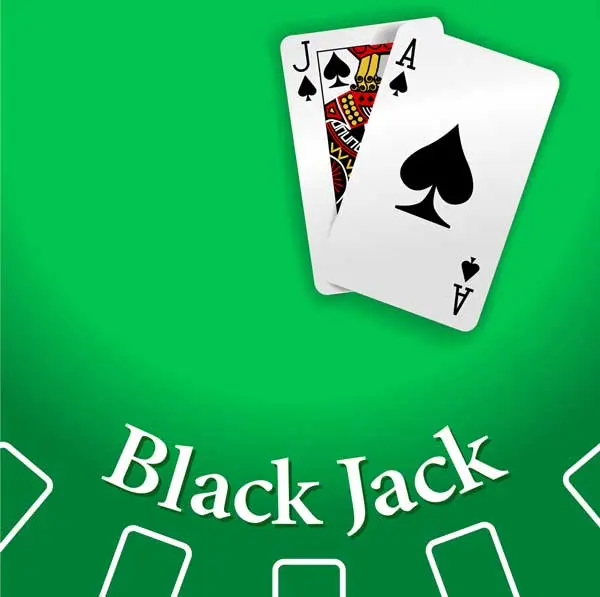
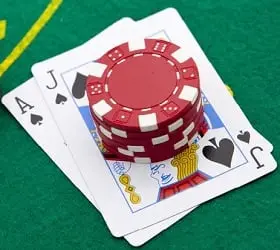 Blackjack, also known as a game of 21, is a popular casino game that takes skill, foresight, and a small degree of luck. The objective of the game is simple – beat the dealer.
To do so, you need to put together a hand that has a higher value than the dealer’s hand, by getting a hand as close to 21 or hitting 21 outright. In order to achieve this, you would need to meet either one of three conditions:
Blackjack, also known as a game of 21, is a popular casino game that takes skill, foresight, and a small degree of luck. The objective of the game is simple – beat the dealer.
To do so, you need to put together a hand that has a higher value than the dealer’s hand, by getting a hand as close to 21 or hitting 21 outright. In order to achieve this, you would need to meet either one of three conditions:
- You will either draw a hand totaling 21 and beat the dealer outright. This is known as ‘Blackjack’ and is the strongest hand.
- You will put together a combination of cards that would get you as close to 21 without crossing that threshold, and your hand value would still be higher than the dealer’s hand.
- The dealer himself will break past the 21-point range, losing outright and thus announcing you as the winner of the round.
Basic Rules of Blackjack - Hand Value and Game Set-up
Learning the Blackjack card game rules is very easy. Before you start playing you need to learn the value of each individual card. A standard deck contains 52 cards, and Blackjack can be played with one, two, or more decks. Of course, the more decks a Blackjack game has, the more difficult it becomes for players to follow through with probabilities. Six and eight-deck Blackjack is commonly referred to as ‘shoe,’ and it’s the most popular version you will find. Regardless of the version of the game, all cards will read as follows:- All cards from 2 through 10 are equal to their face, or ‘pip’ value. Therefore, a 2 has a value of 2, a 5 has a value of 5, and so forth.
- All cards after that, including J, Q and K will count as 10.
- An Ace is flexible and it can count as both 1 and 11, making it the most valuable opening card to have. This makes it easy for the player to take more risks and continue adding to their hand even after the second card.
How to Play Blackjack 21
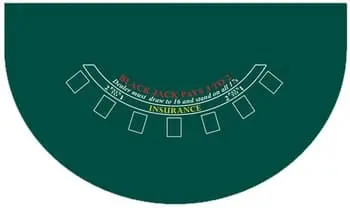 Wager - To begin playing Blackjack, you will first need to make an opening wager. Online casinos are unique as they allow players to be a little more flexible with the bets they make. As a result, you can start as low as $1 with your basic wager.
Wager - To begin playing Blackjack, you will first need to make an opening wager. Online casinos are unique as they allow players to be a little more flexible with the bets they make. As a result, you can start as low as $1 with your basic wager.
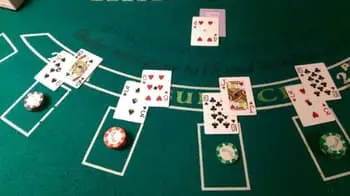 The Deal - Once the wager has been placed, you will have to understand how Blackjack is dealt. The dealer will deal one card face-down for themselves and one card face-up for you and all other players, after which they will deal an extra face-up card so everyone has 2. Dealing is always clockwise. This leaves all players on the table with 2 face-up cards, and the dealer with 1 face-up and 1 face-down card. Dealing in an online game of Blackjack is instant, as it’s done by automated software. If you play a live dealer blackjack game, you will see an actual person dealing from the ‘shoe,’ where the cards are kept.
The Deal - Once the wager has been placed, you will have to understand how Blackjack is dealt. The dealer will deal one card face-down for themselves and one card face-up for you and all other players, after which they will deal an extra face-up card so everyone has 2. Dealing is always clockwise. This leaves all players on the table with 2 face-up cards, and the dealer with 1 face-up and 1 face-down card. Dealing in an online game of Blackjack is instant, as it’s done by automated software. If you play a live dealer blackjack game, you will see an actual person dealing from the ‘shoe,’ where the cards are kept.
Blackjack for Beginners: What Happens After the Cards Are Dealt?
Now that you have been dealt your hand, you have to decide what to do next. Ideally, you want to hit Blackjack on your first hand – i.e. an Ace and a 10-value card. However, the chances of this happening are only 4.8%, regardless of the number of decks you are playing with. It’s important that you remember to only consider the dealer’s hand. You are only playing against the house and not anyone else at the table. Meanwhile, you have the following options: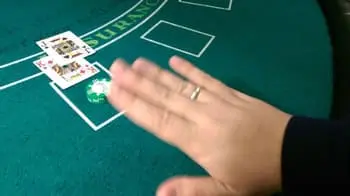 Stand – If you believe your cards are satisfactory as they are, you will just hit Stand, signaling the dealer that you are prepared to go ahead with your hand. All players will take turns deciding what to do as well.
Stand – If you believe your cards are satisfactory as they are, you will just hit Stand, signaling the dealer that you are prepared to go ahead with your hand. All players will take turns deciding what to do as well.
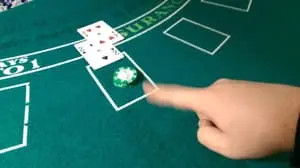 Hit – If you think your hand can be improved, you can choose Hit and receive another card. You can Hit as many times as you see fit unless you go bust, at which point your hand and your stake are lost.
Hit – If you think your hand can be improved, you can choose Hit and receive another card. You can Hit as many times as you see fit unless you go bust, at which point your hand and your stake are lost.
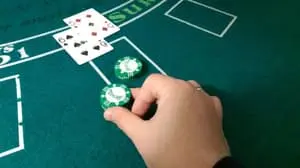 Double Down – If you want to be dealt one, and only one, additional card and also want to raise the stakes, you can request a Double Down which is essentially a Hit while doubling your original bet. Some casinos may allow you to bet only half of your original bet as an additional amount, but most online casinos will accept the same amount.
Double Down – If you want to be dealt one, and only one, additional card and also want to raise the stakes, you can request a Double Down which is essentially a Hit while doubling your original bet. Some casinos may allow you to bet only half of your original bet as an additional amount, but most online casinos will accept the same amount.
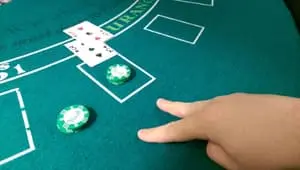 Split – To split your hand, you will need to have a pair or any two 10-point cards. The dealer will deal each hand a second card. The player may then Hit, Stand, or Double Down for each hand.
Split – To split your hand, you will need to have a pair or any two 10-point cards. The dealer will deal each hand a second card. The player may then Hit, Stand, or Double Down for each hand.
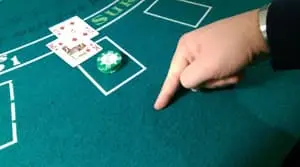 Surrender – This option doesn’t just focus on forfeiting your hand. You can also claim back half your stake, which is a good way to get out of the game if you have reason to believe that your hand won’t pay off and it’s pointless to continue playing.
As well as choosing your next move after your 2 cards are dealt, it is important to understand Soft and Hard Hands, and several other terms you will encounter during your play.
Surrender – This option doesn’t just focus on forfeiting your hand. You can also claim back half your stake, which is a good way to get out of the game if you have reason to believe that your hand won’t pay off and it’s pointless to continue playing.
As well as choosing your next move after your 2 cards are dealt, it is important to understand Soft and Hard Hands, and several other terms you will encounter during your play.
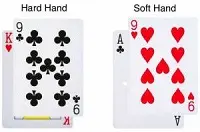 You will hear this term being thrown around all the time and it’s important to understand what it means. A ‘Soft’ hand in Blackjack is a hand that contains an Ace. It’s soft because it’s flexible - the value of the Ace can be either 1 or 11. A ‘Hard’ hand means that you don’t have an Ace, the value of your cards is therefore fixed and not subject to change unless you draw more cards.
Push
When a player and the dealer have the same hand value, then the player's bet is returned. This result is called a push.
You will hear this term being thrown around all the time and it’s important to understand what it means. A ‘Soft’ hand in Blackjack is a hand that contains an Ace. It’s soft because it’s flexible - the value of the Ace can be either 1 or 11. A ‘Hard’ hand means that you don’t have an Ace, the value of your cards is therefore fixed and not subject to change unless you draw more cards.
Push
When a player and the dealer have the same hand value, then the player's bet is returned. This result is called a push.
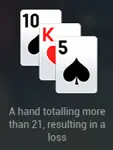 Bust - If a player draws an additional card (or more than one if he chooses) and this card causes the player's points total to exceed 21, then he loses his bet and is bust.
Bust - If a player draws an additional card (or more than one if he chooses) and this card causes the player's points total to exceed 21, then he loses his bet and is bust.
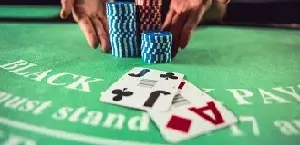 House Edge - The house edge is a measurement term for the casino or dealer's advantage over the player in Blackjack. Even using a basic blackjack strategy the house edge will fall between 0.5% to 1%. Many newcomers to blackjack ask "How is it possible if all the players and dealers are being dealt cards from the same deck(s) that there is a house edge at all?". The simple explanation is that when a player goes bust he has lost his bet no matter if the dealer has a hand that wins or also goes bust.
There is plenty of useful Blackjack information that will help you determine which action must be played according to a specific situation.
House Edge - The house edge is a measurement term for the casino or dealer's advantage over the player in Blackjack. Even using a basic blackjack strategy the house edge will fall between 0.5% to 1%. Many newcomers to blackjack ask "How is it possible if all the players and dealers are being dealt cards from the same deck(s) that there is a house edge at all?". The simple explanation is that when a player goes bust he has lost his bet no matter if the dealer has a hand that wins or also goes bust.
There is plenty of useful Blackjack information that will help you determine which action must be played according to a specific situation.
Playing Blackjack - A Few Basic Rules to Consider
Blackjack is a game that is bound by statistical probability and yet, you don't need to be a mathematical whizz to get ahead in the game. Simply enough, there are some basic rules found in reliable spreadsheet graphics that you can commit to memory that will help you out with otherwise difficult and misleading situations. Once you get a hand on the basics, be sure to read our blackback tips and strategies article for an in-depth, more advanced approach to winning at blackjack.But, for now, let’s begin! To Double, Hit, or Stand?
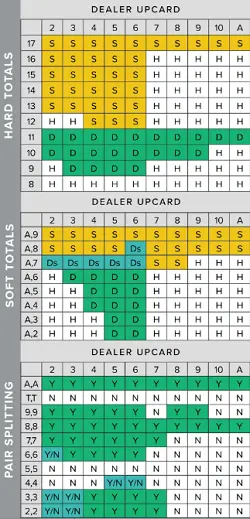 There are some basic rules, applicable to 4-deck to 8-deck Blackjack, regarding doubling, hitting, and standing as well. Let’s start with Hit and Stand:
There are some basic rules, applicable to 4-deck to 8-deck Blackjack, regarding doubling, hitting, and standing as well. Let’s start with Hit and Stand:
- Hit anything equal to or below 11
- Stand if you have a hard 12 and your dealer has 4-6’s. If the dealer has 7 or higher, you will need to Hit
- Stand if you have hard 17 as it’s statistically unjustifiable to take on any more risk
- Don’t hesitate to hit a soft 17
- Stand on a soft 19, as you are once again very close to the 21-point winning condition
Hard hands
- Double 9 against dealer’s 3-6’s
- Double 10 unless the dealer has 10 or Ace
- Double 11 unless the dealer has 11
Soft hands
- Double 13/14 if the dealer has 5-6
- Double 15/16 if the dealer has 4-6’s
- Double 17/18 if the dealer has 3-6’s
Don’t Split Your 5’s and 10’s
While it may seem perfectly fine to want and split a hand of 5’s, there is little sense in doing so. Two 5's already give you 10, which in most cases should be followed by a ‘Hit’ on the part of the player. As to the 10’s, with 2 of these in your starting hand, you are already at 20, which is one point shy of Blackjack. You should consider hitting ‘Stand’ and await the dealer to turn up their face card.Is Insurance in Blackjack Worth It?
Insurance is another popular type of bet, but its practicality is questionable. With an insurance bet, you want to make sure that you won’t lose your original stake by committing even more money – i.e. the insurance bet itself. So, if you see that a dealer has a face-up Ace, you are assuming that they will have a ‘natural Blackjack’. You can place an insurance bet for half the amount of your stake. Let’s say you have bet $4 and now want to make sure you will get it back if you lose. You place a $2 insurance. If you are right, and the dealer had a natural blackjack, you get the original stake back, but lose the insurance. It doesn’t seem a bad idea in general, but most professional players will advise surrendering instead of gambling away your money.Try to Avoid the Side Bets Games
There is another type of bet that has been introduced to online Blackjack in recent years known simply as ‘side bets.’ Now, side bets have nothing to do with Blackjack as such. They have been inspired by other games, such as roulette. Examples of such bets include Super Evens, Lucky Ladies, Pair Square, Over/Under 13, and others. They generally upset the probabilities by too much to be worth playing unless that’s your specific strategy.When to Surrender and Split in Blackjack?
You will want to surrender when you have a hard 16 – so long as it’s not a pair of 8’s. This only applies if your dealer has 9, 10, or Ace. Similarly, if you hold a hard 15 vs a dealer’s 10, Surrender is the recommended course of action here. So far as splits go, you already know that 5’s and 10’s should never be split, to begin with. You will want to split your 2’s and 3’s against any 4-7 dealer hand, however. It’s very important to know if Doubling After Splitting (DAS) is allowed, though, as it would be part of most strategies. For example, you will want to split your 4’s against a dealer’s 5 or 6, but only so long as DAS is allowed. Other recommended actions are split 7’s against dealer’s 2 – 7’s and split 9’s against 2- 9 (except the 7). It can get a little confusing very quickly. These are individual scenarios, which have been play-tested. Some players may disagree with certain play-outs whereas others may embrace them fully. As you gain more experience, you will be able to make up your own mind.Are Blackjack Betting Systems Worthwhile?
When playing online Blackjack, you will have immediate access to a number of Blackjack cheat sheets that describe every possible situation. While some strategy guides advise you simply how to manage your money – i.e. whether to bet more after a loss, for example, these spreadsheets tell you what to do specifically based on several factors, including:- Your hand
- Dealer’s hand
- Dealer’s action
- Number of decks
How to Play Blackjack - A Summary
Of course, you don’t need to follow these rules blindly. The majority of online Blackjack games have free blackjack versions, which means that you can test every scenario for yourself and keep track of whether something is helpful. In time, you will see that statistically, you are winning more by following these play-tested rules.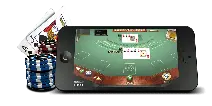 Blackjack online is becoming increasingly popular, specifically because players are happy to spend some time studying a more complex game and maximize their potential payouts. Today, you have a chance to learn all that you need to know to win.
Blackjack online is becoming increasingly popular, specifically because players are happy to spend some time studying a more complex game and maximize their potential payouts. Today, you have a chance to learn all that you need to know to win.





